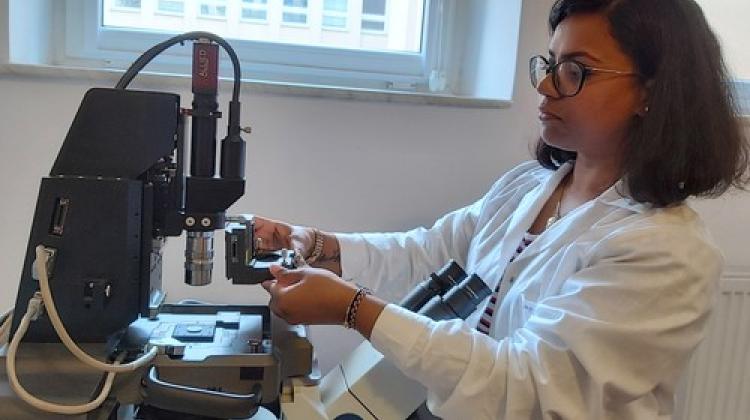Old cancer cells like a Trojan horse
 Photo: Fotolia
Photo: Fotolia
Cancers can use a secret weapon: their old cells "lurk" and suddenly produce up to a dozen descendant cells that cause the disease to resume. Studies have confirmed this, including the research of Dr. Halina Waś from the Military Institute of Medicine in Warsaw. Now she studies cancer cells under hypoxic conditions that prevail in the body.
It would seem that old cancer cells no longer divide. After all, it is the domain of fully vital cells - says Dr. Halina Waś, who conducted research on cells of colon cancer and glioma together with her team. Researchers have proven that an old cancer cell divides in an unusual way that can promote the recurrence of the disease.
WHERE OLD CANCER CELLS COME FROM
The researcher explains that aging of cancer cells occurs in response to chemotherapy or radiotherapy. And it is connected with the fact that cancer cells cease to multiply. Until now, cellular aging has been a slightly overlooked process. Most doctors and scientists focused on killing cancer cells. But sometimes the therapy does not reach the deepest layers of the tumour: it only kills the cells on its surface, and only subdues those in the depths. They are the source of recurrence of the disease.
"Chemotherapy is a double-edged sword - it also damages the patient`s healthy cells. That is why aging, which is achieved by using lower doses of drugs, could be a safer version of the therapy. Cancer cells cease to divide, the development of the disease is stopped and the patient experiences fewer side effects. It sounds good, does it not? Unfortunately, the latest research - including ours - shows that these old cells can divide and thus contribute to the recurrence of the disease" - says Dr. Waś.
She explains that the main goal of therapy is to kill cancer cells. But the tumour, like our whole body, has a three-dimensional structure. During chemotherapy, the drug is administered via an intravenous infusion and enters the tumour with the blood. Unfortunately, its concentration is not the same in different parts of the tumour.
"The further into the tumour, the less blood vessels there are and the more difficult the blood flow is, so the cells in the outer part of the tumour will die in response to chemotherapy, but those inside will age, and those even deeper will divide without limitations" - the biologist says.
Dr. Waś began researching the aging of cells in the team of Prof. Sikora from the Nencki Institute of the Polish Academy of Sciences. She currently works at the Military Institute of Medicine in Warsaw, at the Laboratory of Molecular Oncology and Innovative Therapy headed by Prof. Claudine Kieda. As part of the National Science Centre Sonata Bis grant she is building her first team. She intends to combine basic science with medicine.
"We have a hospital nearby. We want to find solutions that we can propose to patients in the future" - the researcher declares. "Old cancer cells are one of our therapeutic goals".
WHY "SUFFOCATE" CANCER CELLS
Scientists are currently checking how cancer cells function in almost anaerobic conditions - such as those that prevail in our bodies. So far, the majority of laboratory experiments have been carried out under atmospheric conditions, where the oxygen concentration was 21 percent.
"In the new team, we`re interested in hypoxia. Oxygen concentration in the body is not the same as in the laboratory. Even in the lungs, the concentration is 14%. The deeper we go into the tissues, the less oxygen there is. In cancer cells it could be less than 1 percent. This is hypoxia" - explains Dr. Halina Waś.
Special equipment allows her to perform experiments in more physiological conditions for cancer cells living in the body. The biologist wants to check if their response to the drugs will be the same. Together with her team, she will check whether the cells of different cancers will age in response to treatment and whether they will have the characteristics of cancer-initiating cells also under hypoxic conditions. The next stage of the research will be carried out on mice. In the third stage, the researchers will study the material collected from cancer patients treated with chemotherapy.
Dr. Halina Waś conducted her first research on the role of oxidative stress in the development of skin cancer in the team of Prof. Dulak and Prof. Józkowicz at the Jagiellonian University in Krakow.
The laureate of the START and INTER programs of the Foundation for Polish Science is an ambassador of the campaign #JestemStartowcem. She encourages those scientists who have succeeded in research or commercialisation of their ideas to contribute to the budget of the START stipend programme.
PAP - Science in Poland, Karolina Duszczyk
kol/ zan/ kap/
tr. RL
Przed dodaniem komentarza prosimy o zapoznanie z Regulaminem forum serwisu Nauka w Polsce.



















